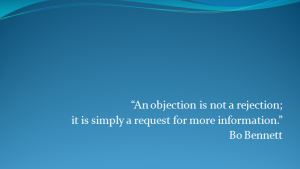We recently launched a series of free video training tutorials on our website and YouTube channel aimed at making your counselors even better at their jobs. On our website you’ll find an ever growing list of admission counselor tutorials. Subscribe to our YouTube channel for more tutorials, powerful data from national co-sponsored studies and interviews with some of your peers.
 Let’s take a moment and focus on the critical final step in the model of communication that will lead to higher yield for your college or university: CLOSING.
Let’s take a moment and focus on the critical final step in the model of communication that will lead to higher yield for your college or university: CLOSING.
Did you cringe? Some readers may be thinking, “I am not in sales. I work for a highly-respected college.” I agree! That’s not what closing is about.
In the college admissions process, closing simply means getting the student to take the next logical step on the path to enrolling. That might mean asking the student to schedule a campus visit. Or complete an application. Or agree to meet students of like mind and interests on your campus.
In admissions we’re not in the business of imposing something on someone. We’re in the business of understanding how the student can best be served and suggesting the next logical step in providing the service we know they’ll benefit from. Many prospective students and parents have never been through this complex process of selecting a college. They need us to tell them what a good next step would be and why. And if we don’t do that for them then we’re not serving them well. If we don’t take charge then we’re not doing our duty for them or our institution.
There are many milestones on the path to enrolling. But in every conversation you have with a prospective student or parent, whether it is the first or the fifth, you should end with a suggestion that the student take the next logical step.
If the student indicates that a roadblock exists, you have to uncover his or her objection or concern. You may find that the objection or concern is rooted in a lack of information or a false assumption that the student or parent may have about your institution. You will never uncover that without asking for the next step and, if they resist, asking why. (You wouldn’t believe all of the funny false assumptions that counselors have told us they’ve heard from prospective students who didn’t want to take the next step. One Florida counselor told us a student didn’t want to move forward because she’d heard alligators sometimes get in the women’s dorm. The counselor assured her that she’d be safe from that.)
Many counselors tell us they are apprehensive about closing. They feel as though they are being intrusive or pushy by asking the student to take some action.
In truth, closing is a natural part of the dialogue. For the student, it signals the college’s desire to recruit them. They expect counselors to ask them to take action so it’s no surprise to them when they do. As a matter of fact, we have found that some students are disappointed when they are not asked to make some kind of commitment to the college. It signals a lack of desire on the part of the college.
Have you ever heard the expression, “Don’t get in your own way?” That is exactly what you are doing if you fail to ask for the close. Most counselors say that once they got into the habit of closing they were surprised at how many times prospective students happily agreed to take the next suggested step.
Closing, like the three other elements we have outlined in the model of communication, ensures you the most productive conversations with students. Embrace the model, and you and the students you serve will be more successful.
Longmire and Company’s on-campus Interactive Training Workshops dramatically improve the performance of counselors and staff in areas such as effective communication with students and parents, applying creative entrepreneurship to their jobs, validating past and planned actions against outcomes, and discovering and leveraging the motivations of students (and themselves).
The end result is improved service to prospective students and families, measurable increases in yield, increased counselor and staff job satisfaction, enhanced teamwork, and innovations in work process within the department.
If you’ve thought about helping your staff with professional development, now is the ideal time to train and motivate your staff. Email or call me if you are interested in how we can help. Continue the conversation on Twitter @LongmireCo. For more information about Longmire and Company and the tools we have to offer, click here. Be sure to subscribe to Versions of Conversion today so you can stay up-to-date.
 Bob Longmire is President of Longmire and Company, Inc. He is a recognized expert on the topic of how prospective students and parents form their college selection decisions – and how colleges can use that knowledge to grow and control their enrollment. He can be reached at (913) 492-1265, ext 709 or at blongmire@longmire-co.com. Connect with Bob at Linkedin/in/boblongmire.
Bob Longmire is President of Longmire and Company, Inc. He is a recognized expert on the topic of how prospective students and parents form their college selection decisions – and how colleges can use that knowledge to grow and control their enrollment. He can be reached at (913) 492-1265, ext 709 or at blongmire@longmire-co.com. Connect with Bob at Linkedin/in/boblongmire.

 Rick Montgomery is as an Enrollment Strategist at Longmire and Company. With over 20 years in higher education marketing, he brings an innovative and dynamic approach to helping colleges and universities meet their enrollment goals. Rick can be reached at 913/492.1265 x.708 or via email at
Rick Montgomery is as an Enrollment Strategist at Longmire and Company. With over 20 years in higher education marketing, he brings an innovative and dynamic approach to helping colleges and universities meet their enrollment goals. Rick can be reached at 913/492.1265 x.708 or via email at 

